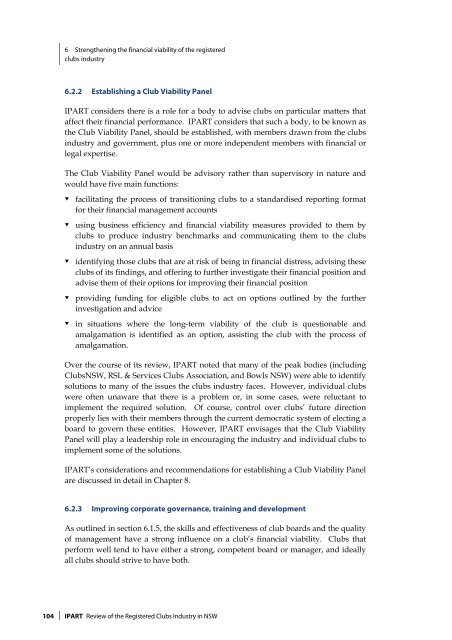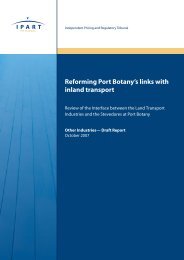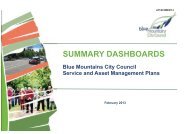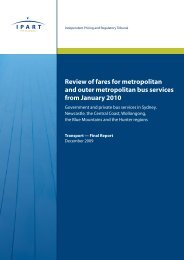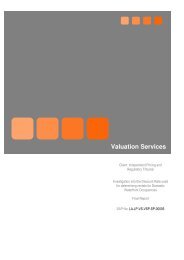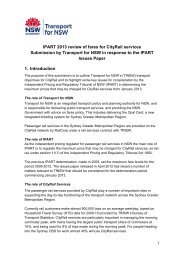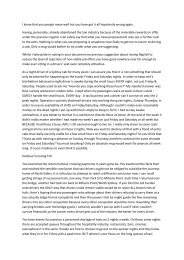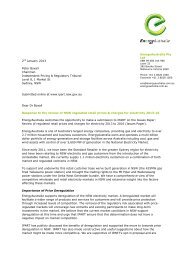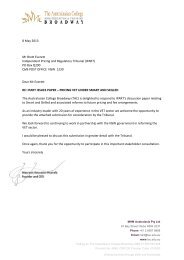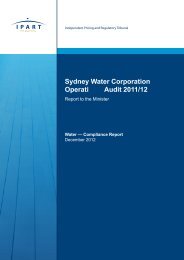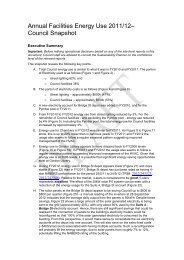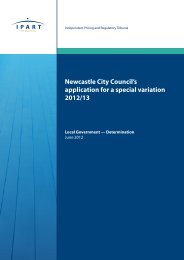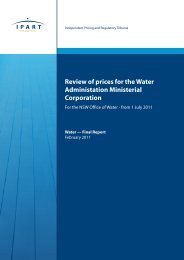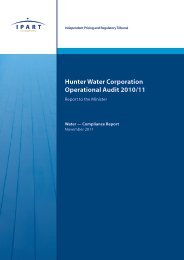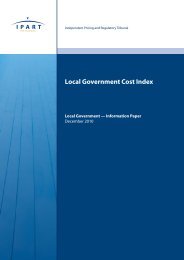Review of the Registered Clubs Industry in NSW - Clubs NSW
Review of the Registered Clubs Industry in NSW - Clubs NSW
Review of the Registered Clubs Industry in NSW - Clubs NSW
You also want an ePaper? Increase the reach of your titles
YUMPU automatically turns print PDFs into web optimized ePapers that Google loves.
6 Streng<strong>the</strong>n<strong>in</strong>g <strong>the</strong> f<strong>in</strong>ancial viability <strong>of</strong> <strong>the</strong> registered<br />
clubs <strong>in</strong>dustry<br />
6.2.2 Establish<strong>in</strong>g a Club Viability Panel<br />
IPART considers <strong>the</strong>re is a role for a body to advise clubs on particular matters that<br />
affect <strong>the</strong>ir f<strong>in</strong>ancial performance. IPART considers that such a body, to be known as<br />
<strong>the</strong> Club Viability Panel, should be established, with members drawn from <strong>the</strong> clubs<br />
<strong>in</strong>dustry and government, plus one or more <strong>in</strong>dependent members with f<strong>in</strong>ancial or<br />
legal expertise.<br />
The Club Viability Panel would be advisory ra<strong>the</strong>r than supervisory <strong>in</strong> nature and<br />
would have five ma<strong>in</strong> functions:<br />
<br />
<br />
<br />
<br />
<br />
facilitat<strong>in</strong>g <strong>the</strong> process <strong>of</strong> transition<strong>in</strong>g clubs to a standardised report<strong>in</strong>g format<br />
for <strong>the</strong>ir f<strong>in</strong>ancial management accounts<br />
us<strong>in</strong>g bus<strong>in</strong>ess efficiency and f<strong>in</strong>ancial viability measures provided to <strong>the</strong>m by<br />
clubs to produce <strong>in</strong>dustry benchmarks and communicat<strong>in</strong>g <strong>the</strong>m to <strong>the</strong> clubs<br />
<strong>in</strong>dustry on an annual basis<br />
identify<strong>in</strong>g those clubs that are at risk <strong>of</strong> be<strong>in</strong>g <strong>in</strong> f<strong>in</strong>ancial distress, advis<strong>in</strong>g <strong>the</strong>se<br />
clubs <strong>of</strong> its f<strong>in</strong>d<strong>in</strong>gs, and <strong>of</strong>fer<strong>in</strong>g to fur<strong>the</strong>r <strong>in</strong>vestigate <strong>the</strong>ir f<strong>in</strong>ancial position and<br />
advise <strong>the</strong>m <strong>of</strong> <strong>the</strong>ir options for improv<strong>in</strong>g <strong>the</strong>ir f<strong>in</strong>ancial position<br />
provid<strong>in</strong>g fund<strong>in</strong>g for eligible clubs to act on options outl<strong>in</strong>ed by <strong>the</strong> fur<strong>the</strong>r<br />
<strong>in</strong>vestigation and advice<br />
<strong>in</strong> situations where <strong>the</strong> long-term viability <strong>of</strong> <strong>the</strong> club is questionable and<br />
amalgamation is identified as an option, assist<strong>in</strong>g <strong>the</strong> club with <strong>the</strong> process <strong>of</strong><br />
amalgamation.<br />
Over <strong>the</strong> course <strong>of</strong> its review, IPART noted that many <strong>of</strong> <strong>the</strong> peak bodies (<strong>in</strong>clud<strong>in</strong>g<br />
<strong>Clubs</strong><strong>NSW</strong>, RSL & Services <strong>Clubs</strong> Association, and Bowls <strong>NSW</strong>) were able to identify<br />
solutions to many <strong>of</strong> <strong>the</strong> issues <strong>the</strong> clubs <strong>in</strong>dustry faces. However, <strong>in</strong>dividual clubs<br />
were <strong>of</strong>ten unaware that <strong>the</strong>re is a problem or, <strong>in</strong> some cases, were reluctant to<br />
implement <strong>the</strong> required solution. Of course, control over clubs’ future direction<br />
properly lies with <strong>the</strong>ir members through <strong>the</strong> current democratic system <strong>of</strong> elect<strong>in</strong>g a<br />
board to govern <strong>the</strong>se entities. However, IPART envisages that <strong>the</strong> Club Viability<br />
Panel will play a leadership role <strong>in</strong> encourag<strong>in</strong>g <strong>the</strong> <strong>in</strong>dustry and <strong>in</strong>dividual clubs to<br />
implement some <strong>of</strong> <strong>the</strong> solutions.<br />
IPART’s considerations and recommendations for establish<strong>in</strong>g a Club Viability Panel<br />
are discussed <strong>in</strong> detail <strong>in</strong> Chapter 8.<br />
6.2.3 Improv<strong>in</strong>g corporate governance, tra<strong>in</strong><strong>in</strong>g and development<br />
As outl<strong>in</strong>ed <strong>in</strong> section 6.1.5, <strong>the</strong> skills and effectiveness <strong>of</strong> club boards and <strong>the</strong> quality<br />
<strong>of</strong> management have a strong <strong>in</strong>fluence on a club’s f<strong>in</strong>ancial viability. <strong>Clubs</strong> that<br />
perform well tend to have ei<strong>the</strong>r a strong, competent board or manager, and ideally<br />
all clubs should strive to have both.<br />
104 IPART <strong>Review</strong> <strong>of</strong> <strong>the</strong> <strong>Registered</strong> <strong>Clubs</strong> <strong>Industry</strong> <strong>in</strong> <strong>NSW</strong>


